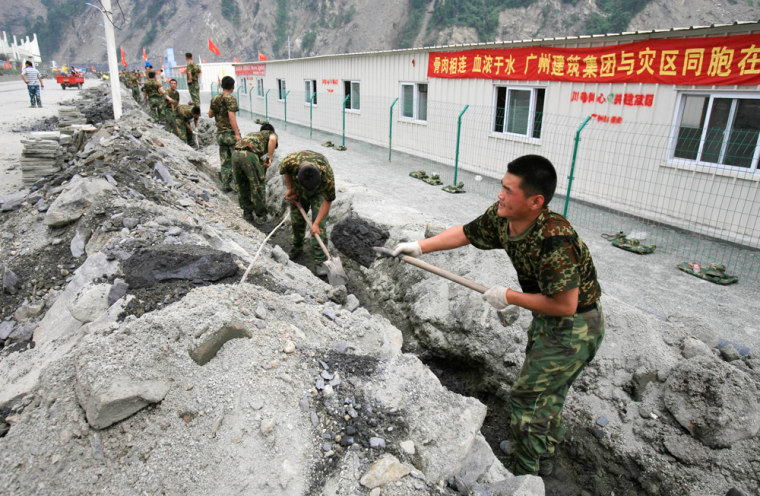The streets here are alive with the sounds — rumbling backhoes, roaring jackhammers, clanging pickaxes — of a town being brought back from the dead.
The 7.9-magnitude earthquake that tore apart Sichuan province in May left the town of Yingxiu in near-silent ruin. Two months later, it is buzzing with activity as soldiers dig trenches for water pipes and temporary housing units rise practically overnight.
It is a remarkable turnaround from a disaster that left nearly 70,000 dead, another 18,000 missing and more than 5 million homeless. As with next month's Olympic Games, the Chinese government pumped money and manpower into earthquake recovery as a matter of national pride and unity.
Knowing their legitimacy rests partly on the ability to deliver in times of crisis, China's communist leadership mobilized 130,000 troops and legions of migrant workers.
In late May, Premier Wen Jiabao stood on this battered spot and pledged to rebuild quake-hit areas in three years. China set up a $10 billion reconstruction fund — compared with the $40 billion spent on the Olympics — slashing budgets across the board to pay for it.
Survivors throughout the region seem genuinely grateful and say they don't want their suffering to detract from the Olympics. At the entrance to Yingxiu, a red banner strung across a section of crumbled highway reads: "Go Olympics, Go Sichuan, Go Wenchuan."
Signs of loss
Nestled in a valley surrounded by green hills, Yingxiu township in Wenchuan county was right at the quake's epicenter. More than three-quarters of its 12,000 residents perished. With roads cut off, survivors were evacuated by boat or helicopter.
Today, the wrecked shell of the town's high school, where hundreds of students died, serves as a reminder of the losses. An altar at a mass grave is piled high with wreaths and incense.
And aftershocks have continued: three tremors, between 4.9 to 6.0 in magnitude, jolted parts of Sichuan and Shaanxi provinces Thursday, killing one and injuring at least 10.
Across the river, the remains of factories, shops and homes rise like matchsticks from the rubble. A slight stench still fills the air, and teams of soldiers constantly spray disinfectant throughout the town.
But there is renewal amid the ruin. In a clearing opposite some destruction, nearly 3,000 one-room units, white with blue trim, have risen on a concrete foundation the size of two football fields. A row of makeshift shops under a striped plastic tarp sells shampoo, noodles and cases of beer.
"In the beginning, I felt very heavy-hearted. I was worried. What if no one takes care of us because it's so remote here and transport is so hard? But the soldiers came. I think they've done a good job," said Liu Shuping, a 53-year-old steel worker who cradled his granddaughter in his arms. His wife and daughter survived, but his son-in-law did not.
An influx of 2,000 soldiers and another 1,500 construction workers from southern Guangdong province ensured fast construction of barracks-style housing, said Xu Hongjun, the town's Communist Party deputy secretary.
"We want to finish soon because we are ready to move on with our lives," he said.
'We are survivors'
The flurry of rebuilding has attracted a few who sensed business opportunities. Wu Xia, 38, whose home in another town collapsed during the quake, headed to Yingxiu to sell cell phones after she heard the government would be setting up a base there to coordinate rebuilding.
She sells about 10 phones a week, priced between $42 and $100 each. "Telecoms are very important, especially at a time like this," Wu said.
On the outskirts of town, several thousand people live in crowded tents, waiting to move out. Survivors are moving into the temporary housing as water and electricity are installed.
"You shouldn't label us victims," said 52-year-old Ma Daohong, who just moved into a one-room home with his wife and two teenage children. "We are survivors. We'd like to say thank you to the government for its help, but now we rely on ourselves to rebuild our homeland."
That sense of resilience is found throughout Sichuan, where survivors are giving their wholehearted support to the Olympics.
China: Go Olympics
In the quake-hit city of Dujiangyan, T-shirts with "Go China" on the front and the Olympic torch on the back flew off the racks in the weeks after the quake, said shopkeeper Qin Ye, 26.
"We sold 40 or 50 a day," she said. "People were united in their need to help people. They wanted to buy something with the symbol of China. They wanted to not only support China but also support the Olympics.
"The Olympics is the pride of the Chinese people," she continued. "I don't want China to lag behind because of what happened in Sichuan."
At a temporary settlement outside Dujiangyan, earthquake survivor He Zichun, 39, recalled how he celebrated with friends in the street when Beijing was named host of this year's Olympics.
"I support the government and I support the Olympics," he said, sporting a pair of shorts with the Olympic rings logo. "Though they invested a lot there, they also helped us. These games are a matter of national pride for us."
The Olympic torch was scheduled to pass through Sichuan in mid-June, but it was rerouted after the earthquake. Now, Sichuan will be the final stop for the torch before it returns to Beijing for the opening of the Olympics on Aug. 8.
He, a barber, said he hopes China will find a way to acknowledge the earthquake during the opening ceremonies. "They should do something. Maybe they will have a minute of silence for tribute. At that moment, for sure, I will cry again," he said.
